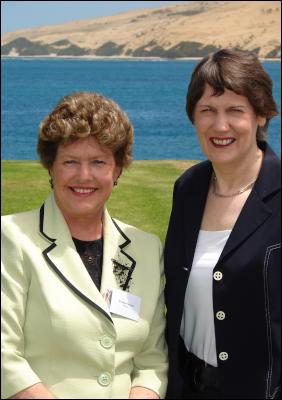Action Call To Energise Far North Economy
The “huge head of steam” built up around Maori economic development was the key to the Far North and New Zealand’s future economic growth, Prime Minister Helen Clark highlighted to a key audience of business, iwi and community leaders at Omapere today.

Mayor Yvonne Sharp of the Far North District Council with the Prime Minister Helen Clark at the Economic Development Summit at the Copthorne hotel at Omapere today. Both the Prime Minister and Mayor Sharp highlighted the need to capitalize on the ‘head of steam’ that Maori Economic Development had built up in the Far North as the key to unlocking the future of growth and social improvement in the region.
New Zealand could not compete in a global sense and expect prosperity if one group of the population was not up to its full economic potential, she said.
The Prime Minister was addressing an Economic Summit at the Copthorne Resort arranged by the Far North District Council to set the foundations for a new economic development strategy for the district.
She said the need to capitalize on Maori economic development had first become apparent at the Hui Taumata in Wellington in March and the opportunity was there to enter into new growth strategies and partnerships.
Ms Clark said broadband was critical to economic modernization in the next decade. Now the Probe programme had been rolled out to all schools in the Far North district it was critical that the message was now taken to the business and private sectors.
“Things have to speed up,” she said.
Minister of Maori Affairs Parekura Horomia told the summit Maoridom was entering a critical period in terms of economic development, and the growth that was already occurring could not be denied.
“Maori success equals New Zealand’s success,” he said.
Far North Mayor Yvonne Sharp and Chairman of the Council’s District Development Sub-Committee Ian Bamber both reiterated that the future of the district is crucially dependent on an all encompassing outlook that also harnessed the talents of young Maori.
Mayor Sharp said that the key to the district’s growth and social improvement was a holistic view that included the environmental, social and economic well being of the Far North.
“The outcomes from the summit will be tailored to the particular needs of the Far North. We need to shape our future, for and by our local people to match our own special place - our particular needs and our aspirations,” Mayor Sharp said.
She said that the Far North needed to attract the type of development that brought vitality and overall well-being into local communities including Maori.
“To ensure that the district reaches its full potential we need to use better and smarter technologies to cope with the tyranny of distance, improving our basic services, and encouraging creative business opportunities that capitalize on our unique assets.
“For example, the recently launched, aquaculture venture up in the remote Parengarenga Harbour where the local iwi Incorporation and NIWA forged a dynamic partnership to develop an innovative kingfish farm – the first of its kind worldwide,” said Mayor Sharp. “As a Council we want to be active and don’t want to sit on the sidelines and hope that things will just happen,” she said. . Ian Bamber also spoke about the importance of harnessing the numbers of young Maori people under 15 that the Far North District has as a major resource for its future economic growth.
“In the Far North Maori economic development is intrinsically linked, and a key driver of the Districts economic well-being,” he said.
The other advantage was the Far North would not necessarily face the problems of an ageing population to the extent that the rest of the country, although there were challenges to overcome.
“I believe that the challenge that we face to ensure that this is a positive is to create ‘labour market magnets’. That is: to increase our ability to train our people, to match the resulting skills with jobs, to send more of our people away to obtain higher education, and to become much better at creating ways for those same people to be able to come back,” Mr Bamber said.
The outcomes and ideas from the key business, iwi and community leaders at the summit’s facilitated workshop sessions in the afternoon part of the programme would feed directly into the Council’s strategy document that would be a roadmap for the region's future.
ENDS


 Dominion Road Business Association: Auckland Transport's 'Bus To The Mall' Campaign: A Misuse Of Public Funds And A Blow To Local Businesses
Dominion Road Business Association: Auckland Transport's 'Bus To The Mall' Campaign: A Misuse Of Public Funds And A Blow To Local Businesses Parrot Analytics: A Very Parrot Analytics Christmas, 2024 Edition
Parrot Analytics: A Very Parrot Analytics Christmas, 2024 Edition Financial Markets Authority: Individual Pleads Guilty To Insider Trading Charges
Financial Markets Authority: Individual Pleads Guilty To Insider Trading Charges Great Journeys New Zealand: Travel Down Memory Lane With The Return Of The Southerner
Great Journeys New Zealand: Travel Down Memory Lane With The Return Of The Southerner WorkSafe NZ: Overhead Power Lines Spark Safety Call
WorkSafe NZ: Overhead Power Lines Spark Safety Call Transpower: Transpower Seeks Feedback On Electricity Investment Short-list For Upper South Island
Transpower: Transpower Seeks Feedback On Electricity Investment Short-list For Upper South Island



